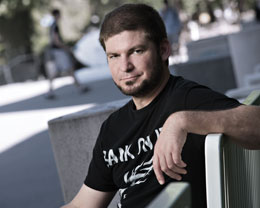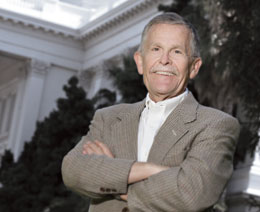Volume 30 · Number 1 · Fall 2012
Involved much?
In a world of overwhelming digital infotainment, even The Daily Show may be too newsy for most students’ taste.

Over the past three years, it has become apparent that almost none of my students reads a print newspaper anymore. On several occasions, I have asked my writing classes two questions: “Who has heard of Susan Boyle?” And, “Who has heard of Abu Ghraib?”
Routinely, far more people know the story of the ugly duckling-come-reality TV pop superstar than know the saga of torture in Iraq carried out in prisons run by the American military. And that, to me, bespeaks a problem. For, while both situations garnered international headlines for a time, by most measures the Boyle story qualifies more as entertainment than as hard news; and by contrast, the Abu Ghraib story is one of enduring relevance, with a truly global impact, rather than momentary notoriety. Yet, in the age of the Internet, and news priorities set by algorithm, the reverse assumption is encouraged.
As a result, increasingly, young people, even at prestigious institutions such as UC Davis, seem disconnected from the sense of a shared political culture and from the notion of a news hierarchy, of what’s important versus simply entertaining. Their common references, in so far as they have them, are those of a borderless, non-place-specific cyber world, a sprawling “infotainment” zone, rather than those garnered by concerned news denizens.
“My sense is students don’t get any information about the larger political scene or the context for it,” says George Barnett, chair of the Department of Communication. “Maybe they’ll watch The Daily Show, or [Steven] Colbert — but increasingly less. They don’t read the newspaper, don’t even go to the news sites to get information.”
I hope readers will bear with me as I present an essay based on a perception. I don’t claim that it’s scientific in its findings, but I do believe that it speaks to an issue of importance.
The author, UC Davis lecturer and journalist Sasha Abramsky, talks about how this generation of college student is neglecting politics because they're not interested.
The Internet, in liberating us from spatial constraints, at the same time creates a sort of news free-for-all, where entertainment and information blend seamlessly into each other, and where those with whom we share news references are as likely to be sitting half a world away as voting with us in our local primaries or national elections. The traditional methods in which a few key news organizations help create a common sense of national priorities and questions no longer hold: What we deem to contain important news value is now far more a matter of personal preference, a literal consumer choice, than of shared experience. For better or for worse, the gatekeeper function of a carefully delineated “establishment” media has dissolved.
Facebook, says Barnett, only feeds political information to those who are already political; what it doesn’t do is channel politics toward the uninitiated. Twitter reduces complex thoughts to a handful of often-abbreviated words. Blogs generally preach to the choir. Despite the smorgasbord of choices offered online, Barnett argues, when it comes to people’s online relationship to politics “there’s virtually no cross-fertilization of ideas.”
Tim Kreiner, a graduate student in the English department who has organized support for the so-called “Davis Dozen” — the students and faculty being prosecuted for a blockade that led U.S. Bank to close its campus branch — says the undergraduates he teaches “are computer literate and Web savvy, but they seem blissfully uninterested in how and where to get news on the Internet.”
One might expect someone involved in Occupy protests to talk up student engagement — after all, what has come to be called “the pepper spray incident” last November briefly made Davis one of the epicenters of the Occupy Movement. But instead, Kreiner is concerned that the majority on campus has opted out of discussions about political choice and political engagement, leaving the dialogue to “a core group of people. It [Occupy and its aftermath] strengthened the interest of those who already had fledgling interest; and did not for those who didn’t.”
Nickolas Perrone agrees. He is one of a group of history graduate students who have been giving presentations around the campus explaining the implications of higher tuition fees on the university system and on the broader California community. Getting ordinary students, who increasingly are either from out of state or out of country, to care about California-specific politics can be a slog. “They don’t see they have much of a stake in it,” he says.

Tim Kreiner, an English graduate student, says Web-savvy undergraduates don’t use the Internet to get news.
(Karin Higgins/UC Davis)
Which leads me to my second, equally anecdotal, poll of students: When I asked my journalism class, shortly after the midterm elections in late 2010, how many of them had voted, my memory is that three out of the 25 raised their hands. I might be off by one or two. But certainly no more than 20 percent of these journalism students in — I stress again — a top-tier institution had felt anything approaching a civic duty to exercise their franchise. It’s in keeping with national trends; around the country, young people are opting out of the political process in frightening numbers. The Center for Information and Research on Civic Learning and Engagement estimated that in this year’s primary, only 2 percent of 18- to 30-year-olds voted in Maryland. In the Illinois primary, the total was 4 percent. In Wisconsin and South Carolina, 8 percent. And the list goes on. Young people are fleeing the county’s dysfunctional political process in overwhelming numbers. Cynical about politics, distrustful of all levels of political and institutional leadership, angered that their voices seem to go unheard, many are taking the path of least resistance — and simply opting out of civic engagement.
Even the fact that UC Davis now runs the UC Center Sacramento, which steeps participants in the workings of the California political process, hasn’t changed this. “I thought when Davis got involved in running the UC Center we’d have a problem managing the [large] numbers of students,” says the center’s director and political science professor Robert Huckfeldt. “Silly me. We’re still struggling on [increasing the] numbers.”
This past June, when I asked another group of journalism students — one of the most engaged, and knowledgeable classes that I’ve taught in my eight years on campus — whether they knew that there were primaries being held the next day, 12 of the 19 students raised their hands. When I asked who was voting, only six of 19 said they were.
These weren’t uninterested students; in fact, over the preceding two months they had repeatedly demonstrated their intellectual curiosity, their concern for the problems confronting California, and their knowledge of the specific problems facing UC Davis in the wake of the pepper spray incident. But the majority of them didn’t see the connection between this basic part of the democratic process — voting in what they clearly saw to be minor league elections — and the daily goings-on in their lives. Yes, they were concerned about tuition increases. They cared about the employment situation and how it affected them and their parents; they knew a ton — some from bitter personal experience — about home foreclosures. And many of them could speak at length about the pepper spraying of their fellow Davisites a few months earlier. But they knew relatively little about the ins and outs of the legislative process; about California’s great policy debates; about significant initiatives on the ballot that day; and about national and international events of importance.
To be fair, this political disengagement among college students stretches far beyond UC Davis and the state of California. In August, for example, researchers at the University of Maryland — reporting on their study of 200 undergraduates living in the shadow of the nation’s capitol — highlighted how little time college students spend following political news. Students reported that they’d be more likely to pay attention to politics if they saw the direct relevance of the November election to their lives. And most didn’t make a significant connection.
So, why the disconnect? In part, I’d suggest, it’s because schools lower down the educational food chain simply aren’t teaching civics with the emphasis they would have in decades past. They are over-strapped, teaching to the No Child Left Behind test requirements and desperate to maintain core curricula in an era of ever-dwindling resources. A 2005 report by the California Campaign to Keep Civics Alive argues that “civic education is no longer a priority in California’s overburdened public schools. History and civics have all but disappeared in many elementary grades … In high school, few students even have social studies in the ninth grade.”
When I asked my students this past year how much of their high school classroom instruction focused on civics, some said up to five hours a week. But students from poorer communities reported virtually no exposure to lessons on how government worked. These students, then, entered university with only the haziest idea about how the country’s complex political processes and institutions functioned. And, once here, they’re not required to study basic civics — the university assumes, apparently erroneously, that they already have that knowledge, since UC admission requirements include a year of U.S. history or a combination of American history and civics or American government.

Robert Huckfeldt, director of the UC Center Sacramento, says scholarships could increase student participation in the center’s public policy and journalism programs.
(Karin Higgins/UC Davis)
But the problem goes beyond a lack of high school classes. After all, in many parts of the world, schools don’t devote a core part of their curriculum to teaching kids how their political processes work — yet those kids become, and remain, civically engaged. Which brings me to the second part of the equation: a broader crisis of news interpretation created by the way we use the Web, and magnified in America by business model changes that have accelerated the collapse of print media. My students stopped reading print news about three or four years ago, but they haven’t found a coherent way to replace what’s missing. When I ask them how and where they get their news today, it’s scattershot — Facebook, Twitter, YouTube, a variety of Internet news sites, or The Daily Show with Jon Stewart. Many simply are channeled toward titillating stories by Yahoo headlines.
Youth disengagement seems rooted in a broader cultural phenomenon. It is, on the one hand, a disengagement born of luxury; despite the deep recession, many young Americans still have enough of a cushion in their personal lives that they don’t see the “urgency of now,” as Obama put it in 2008, playing on a famous Martin Luther King Jr. phrase. In part, though, it’s the opposite — a disengagement born of a cynicism that politics can ever be responsive to the burgeoning needs of ordinary Americans.
That few are politically aware on today’s campuses is, I’d argue, in part reflects the failures of civic institutions to merit the trust of young people today. They see their tuition going up, their job prospects declining, their families struggling. They see a state Legislature seemingly unable to make better California’s problems and a federal political system increasingly paralyzed both by vitriol and by the pervasive influence of big money. And they don’t see the point of buying into a political process that they assume is largely a game of charades.
Nicholas Malone, a senior majoring in English and one of the Davis Dozen protestors, said that distrust is not limited to any age group: “I think we need to ask, first, what it is about politics, as they have been lived and carried out for the better part of four decades, that alienates and incapacitates not just students, but many Americans, and why some have therefore taken it upon themselves to re-imagine what politics are in ways that cannot be readily captured by electoral measures.”
Now, obviously not all UC Davis students are politically disengaged; it’s manifestly not the case today, and in all likelihood never has been. Sure, in the 1960s it was UC Berkeley that commandeered public attention through the radical politics of its students; but Davis also had its share of occupations — including a long one in the Quad — and radical campaigns (including one that ended up with the now-fabled Domes being built, and another that led to the creation of the ethnic studies programs during the 1960s and 1970s.)
Today, there are more than 500 student clubs and organizations on campus, many of them with a political bent. Both the Democrats and the Republicans have strong campus organizations. The Occupy Movement showed that a significant group of students are willing to take to the streets, or the Quad, and to engage in peaceful, creative — and imaginative — civil disobedience, in pursuit of a political vision. And on the other side, ideologically, the Tea Party has had a presence on campus for several years. During the recent GOP primaries, so too did the somewhat amorphous Ron Paul movement. And when former President Bill Clinton spoke at the ARC Pavilion in 2008, thousands of students and others waited in line for hours to get in, suggesting, at the very least, an interest in the superstar-celebrity aspect of politics.
My premise isn’t that the politically inclined have somehow become less so recently — they haven’t — but rather that the massive middle on a campus like UC Davis has either become disengaged or simply remained unengaged over the last few years of turmoil; and that, in an era of rolling crises — be they political, economic, local or international — that is a matter of concern. As a campus we should be doing a better job of communicating the importance of thinking politically. Not what political positions to take, but why and how to think as political animals.
Opting out of political engagement is not a healthy condition. Traditionally, universities have fostered the sense that community matters; that participation in democracy benefits both the individual and the society.
So I would like to leave readers with some questions: Is it still part of the mission of a public university to foster a sense of public engagement, of concern for the common good, however so defined? If it is, how can the university do a better job of so doing?
Building on that last question, should we mandate, as a part of the core curriculum, that students study how America’s political institutions work, or perhaps include classes on how news is made and news priorities generated? Should we make election days university holidays to encourage voting? Should we test students on current affairs to ensure that they keep up with the news? Or perhaps distribute the New York Times, Wall Street Journal and other national newspapers to students for free, as campuses such as the University at Buffalo have done?
Should we give internship credits to students to staff polling places? Should we arrange top-tier speaker series and political debates on campus, and then give students free tickets — as was done for a 2010 gubernatorial debate on campus? The Mondavi Center already gives students a half-price discount on tickets, and free admission to one event of their choice, but half price is still unaffordable for many students. Should we work to fund scholarships to increase participation at the UC Center Sacramento? It wouldn’t cost much; Huckfeldt estimates that $60,000 a year would provide each intern $400 for transportation costs to and from the capital.
I don’t have answers to these questions, but I do know that we have a problem of under-engagement. And the sooner we start to re-engage our young people politically, the better. After all, how can we as a state protect our vital public assets — including the University of California campuses — if our most educated citizens are opting out of the political process?
